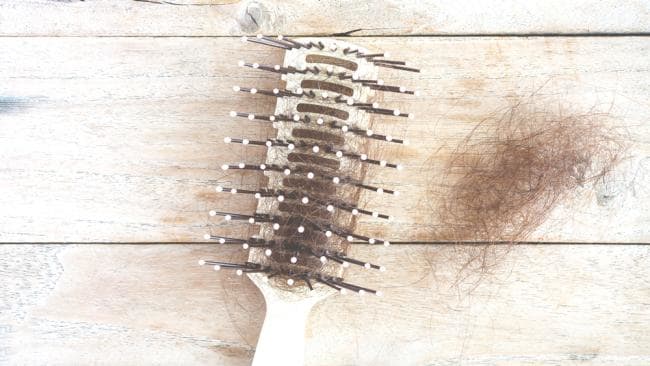|
In a study conducted in mice, researchers from Johns Hopkins were able to confirm that a Western-style diet — high in fats and cholesterol — has a negative impact on hair and skin health. They went even further, however, developing a drug that is able to reverse the damage. In an open access paper recently published in the Nature journal Scientific Reports, Subroto Chatterjee and colleagues from Johns Hopkins Medicine in Baltimore, MD, show that a diet high in fats and cholesterol can lead to skin inflammation, as well as hair loss and hair whitening.
Based on their initial findings, the researchers also developed an experimental drug, D-threo-1-phenyl-2-decanoylamino-3-morpholino-1-propanol (D-PDMP), hoping it would help them reverse the effects of an unhealthful diet on skin and hair. D-PDMP regulates the production of a type of fats (lipids) known as "glycosphingolipids" (GSLs), which are part of the membranes of skin cells and other cell types. In particular, GSLs are a major component of skin cells that make up the external skin layer and of keratinocytes, a type of cell that participates in the pigmentation, or coloring, of skin, hair, and eyes. "Further research is needed, but our findings show promise for someday using the drug we developed for skin diseases such as psoriasis and wounds resulting from diabetes or plastic surgery," says Chatterjee. Western diet tied to hair, skin damage The research team tested the effects that a fatty diet would have on the skin and hair of mice, as well as the effectiveness of the specially designed compound in offsetting the damage. Chatterjee and team worked with a group of mice that they had first genetically modified to express symptoms of atherosclerosis, a condition in which fat deposits form inside arteries, obstructing the free flow of blood. The researchers split the mice into two distinct groups: one of these was assigned a regular mouse diet, while the other was allocated a high-fat, high-cholesterol diet — similar to a Western-style regimen. All the mice were 12 weeks old when they started on their respective diets, and the researchers conducted their first assessments when the mice were 20 weeks old. The team found that the mice on a Western-style diet had begun to lose hair and displayed hair whitening and skin lesions. At 36 weeks of age, 75 percent of the mice that had stayed on the high-fat and high-cholesterol diet had multiple skin lesions, as well as more severe hair loss. When the mice were between the ages of 20-36 weeks, the researchers gave them all D-PDMP in varying amounts, either in liquid form or in capsule form, as they each stayed on their assigned diet. After receiving either 1 milligram and 10 milligrams per kilogram of body weight of D-PDMP in capsule form, the mice on a fatty diet started to regain their lost hair, as well as their initial hair color. Skin damage also started to heal. Chatterjee and team also noted that treating the rodents with 1 milligram of D-PDMP in capsule form per kilogram of body weight was as effective in reversing skin and hair damage as 10 milligrams in liquid form per kilogram of body weight. This, the researchers explain, suggests that capsules are more effective in delivering the compound. Experimental drug may restore health So, what did D-PDMP do specifically? The research team observed that the skin of mice following a Western-style diet showed numerous signs of neutrophil infiltration. Neutrophils are a type of white blood cell that plays a role in inflammation. Encapsulated D-PDMP reduced the number of neutrophils observed, suggesting that the substance was effective in reducing skin damage and inflammation. The researchers also noted that rodents on a fatty diet had modified levels of three important kinds of lipids — ceramides, glucosylceramides, and lactosylceramides — which normally help to maintain skin health. 'Faster, more effective recovery'" Our findings show that a Western diet causes hair loss, hair whitening, and skin inflammation in mice, and we believe a similar process occurs in men who lose hair and experience hair whitening when they eat a diet high in fat and cholesterol," emphasizes Chatterjee. While the study researchers are hopeful about the promising results they obtained with D-PDMP in mice, they nevertheless point out that more animal research has to be carried out, in order to establish exactly how much of the compound is necessary to fully treat the damage caused by Western-style diets in hair and skin. Moreover, the team also warns that the results seen in mice may not apply to people, as that is an aspect that is yet to be confirmed. D-PDMP's safety for human ingestion has also not yet been established. Still, the scientists think of their current findings as the first step toward better ways of maintaining or restoring hair and skin health. This article first appeared on Medical News Today Hair by Brian - The Beauty Blog
Comments are closed.
|
Hair by BrianMy name is Brian and I help people confidently take on the world. CategoriesAll Advice Announcement Awards Balayage Barbering Beach Waves Beauty News Book Now Brazilian Treatment Clients Cool Facts COVID 19 Health COVID 19 Update Curlies EGift Card Films Follically Challenged Gossip Grooming Hair Care Haircolor Haircut Hair Facts Hair History Hair Loss Hair Styling Hair Tips Hair Tools Health Health And Safety Healthy Hair Highlights Holidays Humor Mens Hair Men's Long Hair Newsletter Ombre Policies Procedures Press Release Previous Blog Privacy Policy Product Knowledge Product Reviews Promotions Read Your Labels Recommendations Reviews Scalp Health Science Services Smoothing Treatments Social Media Summer Hair Tips Textured Hair Thinning Hair Travel Tips Trending Wellness Womens Hair Archives
June 2025
|
|
Hey...
Your Mom Called! Book today! |
Sunday: 11am-5pm
Monday: 11am-6pm Tuesday: 10am - 6pm Wednesday: 10am - 6pm Thursday: By Appointment Friday: By Appointment Saturday: By Appointment |


 RSS Feed
RSS Feed